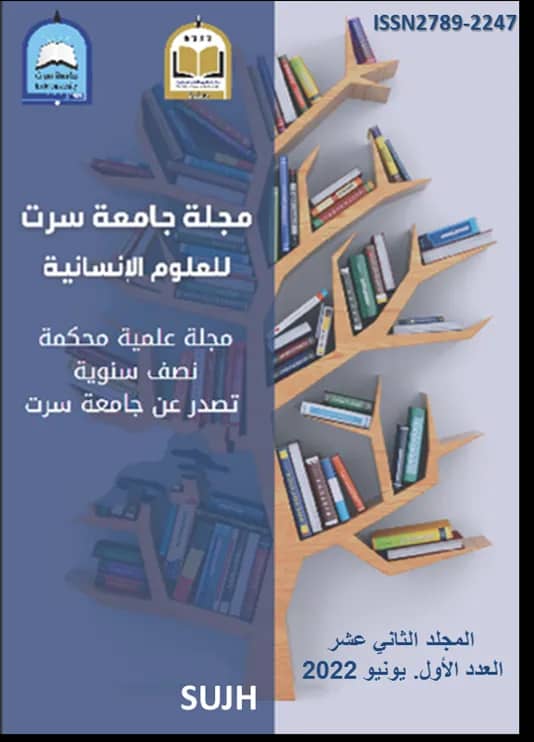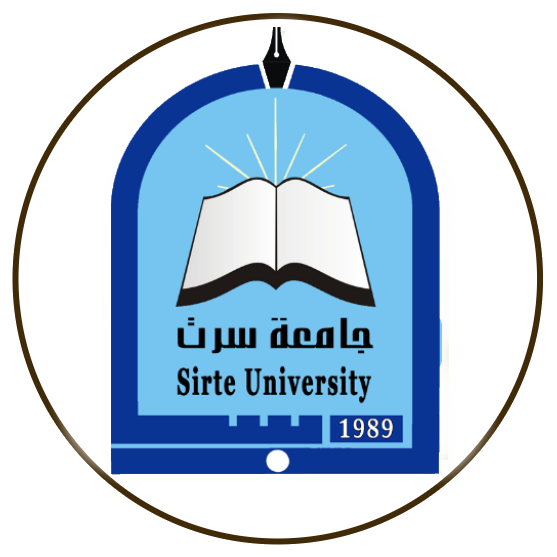منظور أعضاء هيئة تدريس للتعليم الالكتروني لدى التعليم العالي في ليبيا
DOI:
https://doi.org/10.37375/sujh.v12i1.89الكلمات المفتاحية:
تصور المعلم، التدريس عبر الانترنت، التعليم العالي، الأسباب، ليبياالملخص
مع الانتشار الواسع لتقنية الانترنت وارتباطها الوثيق بعملية التعليم، أصبحت مؤسسات التعليم العالي في ليبيا لها دوافع عالية لتطوير وتنفيذ التعليم الالكتروني. تهدف هذه الدراسة إلى التعرف على التدريس الالكتروني في مؤسسات التعليم العالي في ليبيا من وجهة نظر أعضاء هيئة التدريس. كما تهدف إلى معرفة أهم العوائق الحائلة دون تطبيق التدريس الالكتروني. ولتحقيق هذا الهدف، استخدم الباحث المنهج الكمي، ووظف الاستبانة الالكترونية كأداة للدراسة. وتكونت عينة الدراسة من 200 أستاذاً وأستاذةً. وقد أظهرت نتائج البحث أن أعضاء هيئة التدريس في مؤسسات التعليم العالي في ليبيا مدركون لفكرة التدريس الالكتروني كطريقة للتدريس تستخدم فيها التكنولوجيا. لكن لا يزال لديهم بعض الأسباب الكامنة وراء عدم تطبيقهم لمفهوم التدريس الالكتروني. وهذا راجع بحسب رأيهم لأسباب إدارية وتكنولوجية وثقافية. يمكن لنتائج هذه الدراسة أن تشجع صانعي القرار ومؤسسات التعليم العالي على تحسين جودة التدريس عن طريق الانترنت في ليبيا وغيرها
المراجع
Al-Adwan, A. & Smedley, J. (2012.) Implementing E-learning in
- the Jordanian higher education system: Factors affecting impact. International Journal of Education and Development using Information and Communication Technology, 8 (1),121-135.
- Andersson, A. & Grönlund, A. (2009). A conceptual framework for E-learning in developing countries: A critical review of research challenges. The Electronic Journal on Information Systems in Developing Countries, 38 (2), 1-16.
- Azer, M. A, & El-Sherbini, A. M. (2011). Cultural challenges in developing E-learning content. IJET, 6 (1),11-14.
- Al-Badree, A. (2007). Problems of Libyan higher education. Education Symposium of HE and Development in the Jamahiriya, December 31, Tripoli, Libya.
- Al-Mansuri, A.o2 & Al-Mansuri, A. (2015). Utilizing E-learning systems in the Libyan universities: case study; Tripoli university, faculty of Engineering. International Conference e-Learning. Retrieved from
file:///C:/Users/AD/Downloads/UTILIZINGELEARNINGSYSTEMSINTHELIBYANUNIVERSITIES.pdf
- Al-Zoghbi, N. & Khashkhush, A. (2013). Overcoming the barriers to implementing electronic learning in higher education (HE). Retrieved from
https://www.semanticsholar.org/paper/overcoming-the-barriers-to-implement-electronic-in-ElZoghbi
- Bataineh, R. & Baniabdelrahman, A. (2006). Jordanian EFL students’ perceptions of their computer literacy. International Journal of Education and Development using ICT, 2 (2).
- Conceicao, S. (2006). Faculty lived experiences in the online classroom. Adult Education Quarterly, 57 (1), 26-45.
- Edmundson, A. (2003). The decreasing cultural disparity in educational ICTs: Tools and recommendations. Turkish Online Journal of Distance Education, 4 (3).
- El-Fakhri, M. & Bukhatwa, S. (2016). Higher education in Libya: Challenges and plans (in the Arabic Language). EDITORIAL, 1 (1), 27-34.
- El-Kaseh, A. (2015). An investigation of the factors for adopting E-learning in Libyan higher education for learning and teaching ( Published Doctoral dissertation). Murdoch University, Perth, Australia. Retrieved from https://semanticscholar.org/paper/An-investigatio-of-the-factors-for-adopting-in-for-Elkaseh/852e86920380ad28529f717da6c3a6bb33425cf5.
- Gegone, V. & Abdullah , S. (2020). Features of online teaching, NDMU Graduate School. Retrieved from https://www.researchgate.net/publication/344723033FEATURES_OF_ONLINE_TEACHING/
- Ghawail, E., Yahia, S., & Alrshah, M. (2019). Challenges of applying E-learning in the Libyan higher education system. International Journal of Advanced Trends in Computer Science and Engineering, 8 (1/4), 38-43.
- Goyal, S. (2012). E-learning: Future of education. Journal o Education and Learning, 6 (2), 239-242.
- Karmakar, C., & Wahid, C. (2007). Prospects of e-learning in the context of current IT infrastructure of Bangladesh. [Online] available at: http://www.codewitz.net/papers/MMT_83-89_Fullpaper_Wahid_Karmkar.pdf.
- Kenan, T., Pislaru, C., & Elzawi, A. (2013). Investigation of e-learning implementation in HE institutions in Libya. School of Education and Professional Development Postgraduate Research Conference, March 6, University of Huddersfield, Huddersfield, UK.
- Kulal, A., & Nayak, A. (2020). A study on perception of teachers and students toward online classes in Dakshina Kannada and Udupi District. Asian Association of Open Universities Journal, 15 (3), 285-296.
https://researchrepository.murdoch.edu.au/id/eprint/31008/1/wholev2.pdf
- Macpherson, A., Homan, G., & Wilkinson, K. (2006). The implementation and use of e-learning in the corporate university. Journal of Workplace Learning, 17 (1/2), 33-48.
- Mathew, I., & Iloanya, J. (2016). Open and distance learning: Benefits and challenges of technology usage for online teaching and learning in Africa, Pan-Commonwealth Forum (PCF8). [Online] Available at: http://hdl.handle.net/11599/2543.
- Mukhtar, K., Javed, K., Arooj, M., & Sethi, A. (2020). Advantages, limitations and recommendations for online learning during COVID-19 pandemic era. Pakistan Journal of Medical Sciences, 36 (4), 27-31.
- Naveed, O. N., Muhammed, A., Snober, S., Qureshi, M., & Shah, A. (2017). Barrier affecting successful implementation of e-Learning in Saudi Arabian universities. IJET, 12 (6), 94-107.
- Othman, A., Pislaru, C., Kenan, T., & Impes, A. (2013). Analyzing the effectiveness of IT strategy in Libyan higher education institutes. International Journal of Digital Information and Wireless Communications (IJDIWC), 3 (3), 114-129.
- Rahmatulla, S. I, & Sultana, S. & Sultan, G. (2020). E-teaching in higher education: An innovative pedagogy to generate digitally competent students at King Khalid university. Arab World English Journal (AWEJ), 6, 248-260.
- Rhema, A. & Miliszewska, (2010). Towards E-learning in higher education in Libya. Issues in Informing Science and Information and Technology, 7, 423-437.
- Selim, H. (2007). Critical success factors for E-learning acceptance: Confirmatory factor models. Computers and Education, 49 (2),396-413.
- Sife, A. S., Lwoga, E. T., & Sanga, C. (2007). New technologies for teaching and learning: Challenges for higher learning institutions in developing countries. International Journal of Education and Development Using ICT, 3(2), 57-67.
- Walters, S., Grover, K., Turner, R., & Alexander, J. (2017). Faculty perceptions related to teaching online: A starting point for designing faculty development initiatives. Turkish Online Journal of Distance Education-JODE, 18 (4), 4-19.
- Windiarti, S., Fadilah. N., Dhermawati, E., & Pratolo, B. (2019). Teachers' perception towards the obstacles of E-learning classes. Journal of Language Teaching and Literature, 6 (2),117-128.
- Yeung, M., & Yau, A. (2021). A thematic analysis of higher students' perceptions of online learning in Hong Kong under COVID-19: Challenges, strategies and support. Education and Information Technologies, 27, 181-208.











